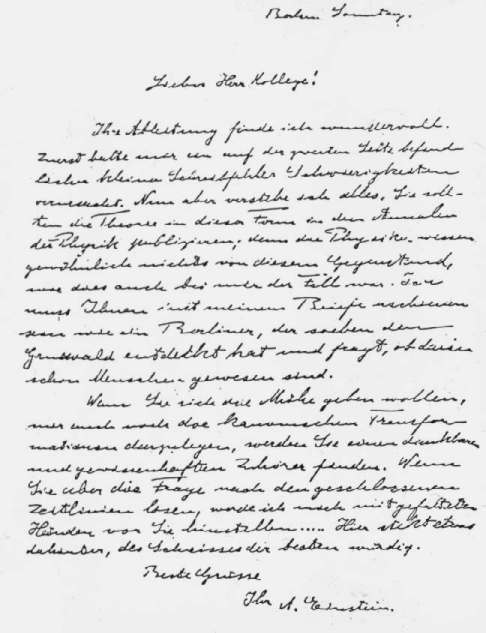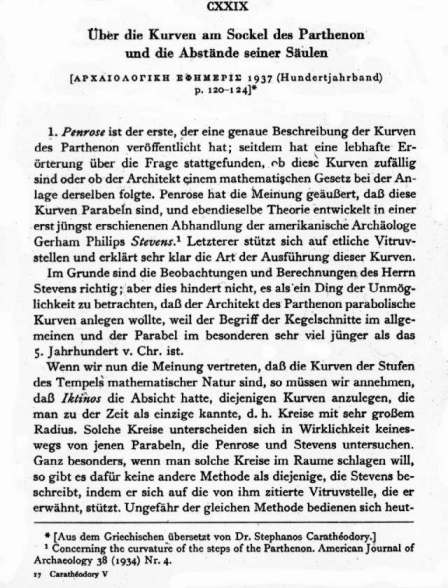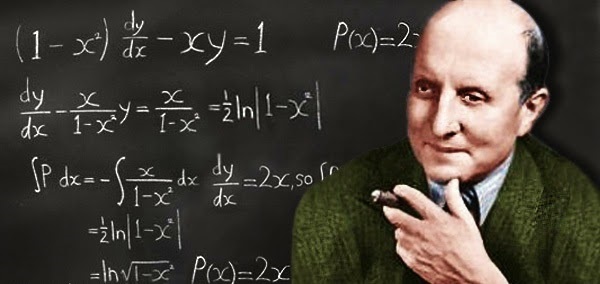Constantin Caratheodory
Constantin Carathéodory (13.9.1873 Berlin/Germany - 2.2.1950 Munich/Germany).
Constantin Carathéodory (Κωνσταντίνος Καραθεοδωρής), Greek-German mathematician who was born in Berlin and died in Munich. He made important contributions to the theory of real functions, conformal representations, calculus of variations, and to the theory of point-set measure, as well as to thermodynamics and relativity theory. Constantin Carathéodory was an extraordinary mathematician from the first half of the 20th century with a great worldwide influence.
Descending from the Greek élite of Constantinople, Carathéodory was raised by his Grandmother in Brussels, graduated from the military school of Brussels, became engineer at the Assiout dam in Egypt and finally dedicated a life of effort to mathematics and education. He studied and embarked on an international academic career, haunted by wars and catastrophes.
Carathéodory studied of mathematics at the University of Berlin beginning in 1900 then began his graduate studies in 1902 at the University of Göttingen, where he received his Ph.D. in 1904 under the supervision of Hermann Minkowski. After teaching at the Universities of Hannover (1909), Breslau (1910-1913), Göttingen (1913-1918), and Berlin (1918-1920), Carathéodory accepted a post at the University of Smyrna in Anatolia. When the Turks razed Smyrna in 1922, Carathéodory saved the university library and moved it with him to the University of Athens, where he taught until 1924. Carathéodory was subsequently appointed professor of mathematics at the University of Munich.
In 1916, Carathéodory when he was a full professor of mathematics in Göttingen, Germany he received this letter from Berlin:

Berlin, Sunday
Dear colleague!
I find your derivation wonderful, now I understand everything. At first, the small writing mistakes on the second page had caused me some difficulties. Now, however, I understand everything. You should publish the theory in this new form in the Annals of Physics since the physicists do not normally know anything about this subject as was also the case with me. With my letter I must have come across to you like a Berliner who had just discovered Grunewald and wondered whether people were already living there.
If you wouldn't mind also making the effort to present to me the canonical transfromations, you'll find in me a grateful and attentive audience. If you, however, answer the question about the closed time trajectories, I will appear before you with my hands folded. The underlying truth, though, is well worth some perspiration.
Best regards, your Albert Einstein.
Albert Einstein with his hands folded in front of Carathéodory. Those weren't just written words. Einstein's letter expresses the general sentiment towards Carathéodory at the time. At the acceptance of Carathéodory into the Prussian Academy of Sciences in Berlin in 1919, no one other than Max Planck gave the honorary dedication. In the previous year, 1918, Carathéodory had returned again to his birthplace, Berlin. What paths had taken him from Berlin to Berlin, and what an unusual life he had led.
The previously mentioned letter of Einstein was part of their correspondence about Hamilton-Jacobi theory. Albert Einstein had then around 1912 set aside his thoughts and ideas regarding general relativity theory and hoped with the help of the tools of Hamilton-Jacobi to arrive at deeper insights. With this in mind, on the 6th of September of 1916 he wrote to Carathéodory. At the end of his letter, Albert Einstein asked Carathéodory: "Would you think a little bit about the problem of closed time trajectories? Here lies the essence of this still unsolved part of the space-time problem. I wish you all the best from yours truly, A. Einstein."
Carathéodory answered on December 16, 1916: "Dear colleague, the main points in the theory of canonical substitutions can be most easily derived in my opinion in the following way." There then comes mathematical expressions from Hamilton-Jacobi theory. The composition ends ... "With best wishes, yours truly, C. Carathéodory."
Recently copies of letters between Einstein and Carathéodory from the period 1916 to 1930 were presented to the Greek officials from Israel's ambassador to Athens.
Carathéodory inherited a talent for languages which extends over generations in his family. Greek and French were his first languages, and he mastered German with such perfection, that his writings composed in the German language are stylistic masterworks. Carathéodory also spoke and wrote English, Italian, Turkish, and the ancient languages without any effort. Much more than that, Carathéodory was a treasured conversation partner for his fellow professors in the Munich Department of Philosophy. The well-respected professor for ancient languages Kurt von Fritz praised Carathéodory, saying that from him one could learn an endless amount about the old and new Greece, the old Greek language, and Hellenic mathematics. The philosopher Kurt von Fritz had an uncountable number of discussions with Carathéodory. Deep in his heart, Carathéodory felt himself above anything "Greek." The Greek language was exclusively spoken in the Carathéodory's house. His son Stephanos and daughter Despina went to a German high school, but they obtained daily additional instruction in Greek language and culture from a Greek priest. At home, they were not allowed to speak any other language.
Erhard Schmidt, himself an important mathematician, once said Carathéodory was completely free of the widespread faults of vanity and jealousy found frequently in the "academic world." "He felt pure joy for others who made great accomplishments."
Carathéodory was reclusive during the dark time in Germany. Maria Georgiadou writes "He never openly mentioned the holocaust or the Nazi crimes against Greece ... kept silent in the face of crimes that violated any idea of human decency, accepted the authority of an illegal state, made his compromises and submitted to the expulsion of Jews from scientific institutions"
He was the head of a church counsel for the Greek church of the Savior on Munich's Salvatorplatz. This church had been given to the Greek orthodox community by the Bavarian king Ludwig I, who greatly admired Greece. In the meantime, Carathéodory was well over 60 years old and plagued by sickness. With his many connections in all parts of the world, though, he was able to give several of his "non-Arian" colleagues a chance for a future by arranging for them an opportunity to emigrate. His colleagues Tietze, Perron, and Sommerfeld probably kept from him many bad experiences they had had. Their gentlemanly conduct in Germany's worst times represents a noble distinction for the Bavarian Academy of Sciences.
Albert Einstein, in a letter from 1946 to Carathéodory's close friend, the phycisist Sommerfeld, "Dear Sommerfeld, it was a true joy for me to receive your lively written words after all the dark years that we had to experience. We could never have imagined how things would turn out. It was a pleasure to hear that you belong to the few who remained intact."
In December of 1949, Carathéodory gave his last talk in the Munich mathematical colloquium about lengths and surfaces. Shortly thereafter he became severely ill. He died on February 2, 1950. He was buried in the Munich Forest Cemetery in field number 303. In honor of Carathéodory, there appeared a few years ago in the USA a two-volume collection with articles of prominent mathematicians from all parts of the world. The writings demonstrated the great influence of Carathéodory's thoughts and ideas in today's mathematics.
The auditorium of the new university in Xanthi, is named after Carathéodory, and it is otherwise well-known to the Greeks today what an extraordinary figure Carathéodory was.
Children: Despina and Stephanos
Caratheodory's grave (his wife and his son also) is in Waldfriedhof Munich/Germany.
Nobody could have said it as well as another famous member of the Bavarian Academy of Sciences, the Geheimrat Oskar Perron: "Carathéodory, one of the most magnificent mathematicians, substantially enriched and vitally influenced the sciences ... a man of unusually extensive education. As a member of the Greek nation, with his soaring spirit and restless pursuit, he continued the recognition of the tradition and legacy of classical Greek culture."

A publication of Carathéodory (in German) considering the shape of the columns of the Parthenon.
Research
Calculus of variations/theory of discontinuous solutions of ode’s.
Function theory: conformal representation of simply connected regions on the unit circle; theory of boundary correspondence.
Geometrical optics.
Helped Einstein to develop theory of general relativity.
Point set measure theory and probability theory.
Thermodynamics.
Borel-Carathéodory inequality See Advanced Function Theory (PS File)
Carathéodory criterion
Carathéodory's Fundamental Theorem
Carathéodory Derivative
Carathéodory extension theorem See Caratheodory’s Extension
Carathéodory-Fejer method
Carathéodory-Finsler manifold
Carathéodory matrix coefficient problem Gongning Chen On the multiple Nevanlinna-Pick matrix interpolation in the class C_p and the Caratheodory matrix coefficient problem Linear Algebra and Its Applications: Volume 283/1-3 (1998)
Carathéodory-Pesin structure, Ya. B. Pesin, Dimension Theory in Dynamical Systems, Contemporary Views and Application, The University of Chicago Press, Chicago and London, 1997.
Carathéodory superposition of multivalued maps
Carathéodory-Rieffen "distances"
Carathéodory-Schur interpolation problem
Carathéodory-Toeplitz theorem/method
Carathéodory topology
Carathéodory-von Neumann algebraic probability
Carnot-Carathéodory metric/problem
Integer Carathéodory property
Julia-Carathéodory theorem , C. CarathéodoryTheory of functions of a complex variable, Vol. II, 2nd English edition, Chelsea, New York, 1960.
Osgood-Taylor-Carathéodory theorem
[1]













